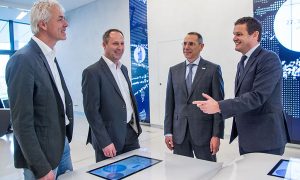“Engineers Are Always in Demand”
“Engineers Are Always in Demand”
Four experts – among them Andreas Wimmer, CEO and Scientific Director at the LEC – talked to the newspaper Kleine Zeitung about technical jobs, the best careers prospects, and about what can be done wrong with digital job applications.
How many employees do you have currently?
Andreas Wimmer: For the most part we act within the highly qualified domain and we just finished the recruitment phase. Within one year we increased by roughly 40 employees, but there are still open positions – primarily in the scientific area and for dissertations.
Markus Dielacher: With this company size there is always a demand for engineers. At the moment we are recruiting in the area Electrical Engineering and Process Engineering, that makes it even harder to find someone. There is more demand than supply.
Hansjörg Tutner: At the moment Magna Steyr has 85 open positions in Austria, 90 percent of them are technology related – from apprenticeships to university graduates and top managers. At the end of 2016 it will be even more interesting, because we will expand the location in Graz by up to 3000 employees by 2018.
How many of them will be temporary workers?
Tutner: In the last years we have changed our philosophy on the subject. Temporary workers have rendered very good results for us and helped us to balance out the fluctuations in the automobile industry. In the meantime the legislator has made temporary employment very unattractive. We will put 90 percent of our new entries in a fixed contract.
We will put 90 percent of our new entries in a fixed contract. Only 10 percent will be temporary workers. –Hansjörg Tutner, Magna Steyr
Gerhard Steiner: We are looking for engineers in all areas. Over the last ten years the search has changed a lot as well. We pay a lot of money to online portal so that we can look at CVs, we maintain and cultivate our engineers and for the most part we have known them for a long time. We employ someone that is in charge of our social media accounts. Without this it will not be possible in the future anymore.
To what extent do applicants from neighbouring countries react when you announce vacancies on social media?
Steiner: We have many applicants from Slovenia. It is not restrained by borders anymore, no matter if it is Twitter, LinkedIn, or Facebook.
Are you satisfied with the standard of education of female applicants from these countries?
Dielacher: We are very satisfied, especially their bases are very good. Once it comes to application they need a little time, but they have excellent basics.
It is very difficult to find employees in the area of process engineering. The demand outweighs the supply. –Markus Dielacher, BDI
Do you require a proficiency in German?
Steiner: We recommend them to make an effort to speak German. This is a social matter – you cannot really integrate yourself during breaks, if you don’t speak the language. At some point the employee will withdraw themselves, loose their enthusiasm and leave the company sooner or later.
Tutner: At the moment we have about 500 Slovenes at our location in Graz, partly with a very impressive level of education. They integrate themselves extremely well and even if they have no prior knowledge of the language there is a great willingness to learn it. This will be a target in the future – an important job market for Magna.
Do applications only happen digitally or does the good old application portfolio still exist?
Tutner: The digital form is the standard. Maybe parents still feel obliged to write something down on paper for their children, apart from that everything runs digitally. One only has to be careful not to send the 30MB application but to package everything in a dashing PDF.
Wimmer: There are often gaps in the CVs without sufficient motives, which complicates job interviews.
We still have open positions – primarily on the scientific area and for dissertations. –Andreas Wimmer, LEC
Is individuality not asked for in applications?
Tutner: The applications are becoming increasingly more professional. If someone deals with this subject today they ask Dr. Google and have the best information desk. With us applicants have the option to upload data on LinkedIn or Xing and that’s their application. And they are becoming more extensive and detailed. A good application amounts to something.
The search for employees has changed. Nowadays we pay to be able to look at CVs on online portals. –Gerhard Steiner, Joham & Partner
What do applicants expect from your companies?
Tutner: Working through your workload linearly is not looked for in jobs nowadays. People are much more interested in the possibilities for development, which on-the-job training there is, if you can take time out to pursue further education or to make a world trip, but also to care for a relative that isn’t doing well. If you don’t have the right response to that as a company, then you take second place in attractiveness as an employer. And about the keyword working-hours legislation: this is not relevant to our time anymore. You need an integral viewpoint, a complex answer to the employee’s want for individual organization.
Dielacher: The topic of work-life-balance plays an increasingly important role. You have to present a company very well in order to get good people.
The conversation was lead by Birgit Pichler, editor of the Kleine Zeitung.
Markus Dielacher, CTO of BDI – BioEnergy International AG mit Sitz in Grambach bei Graz,
bdi-bioenergy.com
Gerhard Steiner, Senior Partner at the personnel consultant and emplyment agency Joham & Partner,
www.johampartner.at
Hansjörg Tutner, Global Director Human Resources at Magna Steyr,
www.magna.com
Andreas Wimmer, CEO and Scientific Director,
LEC GmbH Large Engines Competence Center,
www.lec.at
Press coverage
Kleine Zeitung: Immer Bedarf an Technikern
Kleine Zeitung print und online, 06.02.2016

